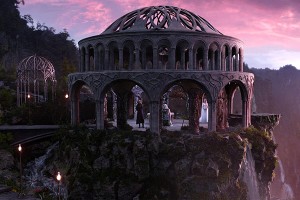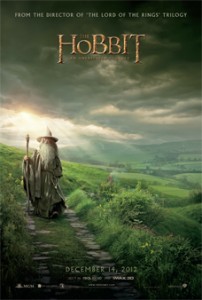Even the word itself, spoiler, comes with connotations of bad. Reminders of food that’s gone off. Anything that spoils entails less enjoyment, not the same amount. And certainly not more. Or so it’s traditionally held.
To which I say, to use a quaint British phrase, “pish and tosh”.
Not because I don’t think it’s impossible for there to be spoilers with an adaptation of a novel that was first published in 1937. There are.
Anything that prematurely reveals a previously unknown plot point, the design of a particular set or the look of a monster or a costume in an adapted work is, indubitably, a spoiler. Although the original work itself may be well-known, the contents of the adaptation itself tend to be shrouded in mystery.
It’s this unusual conjunction of knowledge and ignorance that is precisely the problem.
Allow me to explain.
What those who frown on spoilers overlook is that with an adaptation, those who have read and enjoyed the original work have a pre-existing emotional investment in the text.
For Tolkien’s works, this investment is often substantial; driven by the deep verisimilitude that is particular to the Middle-earth Legendarium.
I know that through many re-reads of Tolkien’s works about Middle-earth that I have my own personal understanding of the themes, characters, places and history of Arda. I have my own feelings about what makes these stories work (what is “essential” and what is “superfluous”). Fellow-reader, I’m sure you have yours also. And your vision probably differs from mine in some respects — and that’s fine! Peter Jackson’s vision is different again (and that’s fine, too!).
For us readers, our relationship with Middle-earth is not solely confined to a few hours in a cinema. It’s deeply embedded, established over years (or decades), and not easily discarded. I assert that this presents a not-insignificant challenge for the reader-cum-viewer who wants to sit down and enjoy Peter Jackson’s (or Ralph Bakshi’s or Rankin Bass’s) movies on their own terms.
(Aside: this also poses a correspondingly steep challenge for the film-maker, but that’s a piece for a different day).
When we sit down to watch an adaptation, we’re doing more than simply watching a movie. We’re simultaneously trying to resolve a collision of vision.
Why are we faced with this situation? Because we enter the cinema largely in the dark about the editorial decisions that have been made. We discover all the big changes — whether for good or for ill — and all the little dialogue inventions along the way.
To me, spending a movie trying to reconcile your internal ideas of Middle-earth against someone else’s concepts is no way to enjoy it. It’s an unwanted distraction at best, and something that actively reduces enjoyment at worst.
Just think: you’re spending the entire movie going “why?”. How can you immerse yourself in a world if you’re constantly going “but that’s not how I thought it was?”?
 Worse, it’s not an even contest. Your internal vision has a massive headstart over the vision that the movie-makers are encouraging you to consider. (And that’s an interesting thought — where does the primacy of vision lie? How fast or slowly do our concepts of these things change over time?)
Worse, it’s not an even contest. Your internal vision has a massive headstart over the vision that the movie-makers are encouraging you to consider. (And that’s an interesting thought — where does the primacy of vision lie? How fast or slowly do our concepts of these things change over time?)
So, instead of waging this enjoyment-sapping internal battle during the film, is it not better to have done all this processing beforehand?
That’s why I propose that spoilers can be beneficial.
They help you process the plot changes beforehand, so you can then immerse yourself fully in the fantasy journey. They get rid of that nagging internal voice that goes “but…”. And, most of all, they allow you to enjoy an adapted work on its own terms.
I want to give myself the best opportunity possible to nix that internal voice and go with the flow. That’s why I read spoilers.
NB: All the above should not be interpreted as an indication that I think spoilers ought to be forced on people. Spoilerage should be up to the individual. I’m very much behind those who (for whatever reason) wish to avoid them — that’s why spoilers should always be marked! Humbly, one tries one’s best to follow through there. People who don’t have the courtesy to do this should be flung off the Bridge of Khazad-dum.
Demosthenes has been an incredibly nerdy staff member of TheOneRing.net since 2001. The views in this article are his own, and do not necessarily represent those of other TORn staff.



